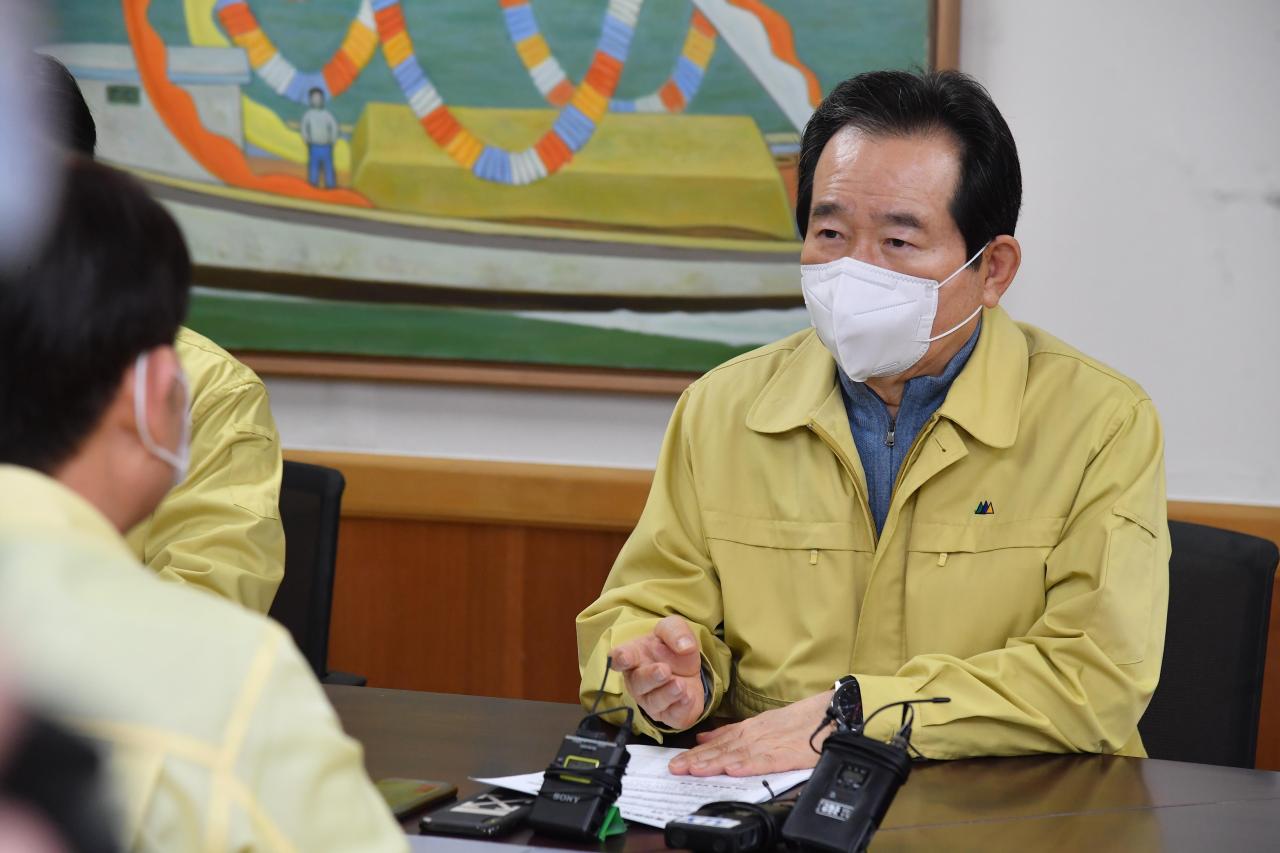The aggravating hospital bed shortage in Daegu has emerged as the most pressing issue in Korea’s desperate efforts to contain the virus, as over 1,600 patients in the virus-hit city remained at home awaiting hospitalization. At least two have died in the process.
Prime Minister Chung Se-kyun said Sunday that the Korea Centers for Disease Control & Prevention, Ministry of Health and Welfare and Ministry of the Interior and Safety are devising a set of measures to attack the matter.
“I expect the (measures) to be discussed at the central disaster control center today,” said the prime minister, who heads the Central Disaster and Safety Countermeasure Headquarters in Daegu.
He mentioned that the city, whose caseload exceeded 2,500 as of Sunday morning, is in need of a new standard to allocate the limited number of hospital beds to priority patients or those in more serious conditions.
Experts have been calling for categorizing patients into groups, depending on the seriousness of their conditions, so that those with mild symptoms could be treated or quarantined in makeshift centers that utilize nonmedical facilities.
“It is urgent to establish a patient care and management system to efficiently distribute medical resources to the right place,” Chung Ki-hyun, head of the National Medical Center, said in a press conference Sunday.
Under the current guidelines from the government, all patients who have tested positive for COVID-19 are required to be hospitalized, but Daegu, the country’s fourth-largest city, has struggled to secure enough beds to meet the quickly growing number of patients.
More than 80 percent of patients in Daegu have relatively mild symptoms, and the remaining 20 percent show respiratory symptoms that need rapid treatment, according to the Central Disaster and Safety Countermeasure Headquarters.
On Sunday, Gwangju, a city surrounded by South Jeolla Province, offered half of the city’s available 105 quarantine beds for Daegu patients.
“We will accept and treat COVID-19 patients from Daegu. I ask for the support of Gwangju citizens in this fight,” Gwangju Mayor Lee Yong-sup said in a press conference.
As of 4 p.m. Sunday, Daegu reported 2,705 cases, up from 2,236 tallied at the same time the previous day.
Some 65 percent, or 1,662 of 2,569 cases, reported in the morning were found to have stayed home awaiting hospitalization. The latest figure was not updated in the afternoon.
The scarcity of hospital beds has resulted in a series of deaths in recent days.
On Friday, a 69-year-old woman died after being self-quarantined at home. Upon showing difficulty breathing, she was transferred to the emergency room of Daegu Catholic University Hospital, but had already died.
A 74-year-old man who returned home after being examined at Daegu Medical Center on Thursday, died after being urgently transferred to Yeungnam University Hospital due to respiratory difficulty.
On Sunday, Daegu Mayor Kwon Young-jin said the city has begun to take steps to minimize damage caused by the snowballing infections, by strengthening monitoring of patients and running a 24-hour health support hotline, which began operations Friday.
By Park Han-na (
hnpark@heraldcorp.com)








![[Today’s K-pop] Blackpink’s Jennie, Lisa invited to Coachella as solo acts](http://res.heraldm.com/phpwas/restmb_idxmake.php?idx=644&simg=/content/image/2024/11/21/20241121050099_0.jpg)